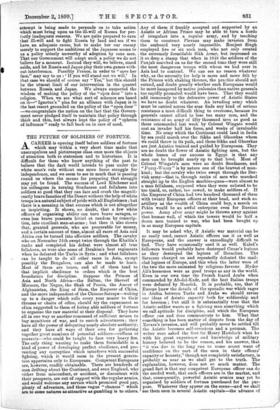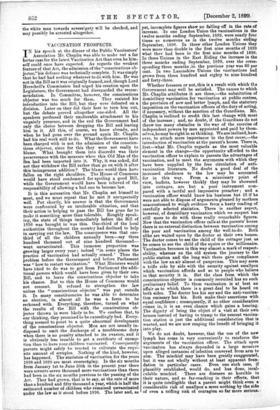THE FUTURE OF SOLDIERS OF FORTUNE.
ACAREER is opening itself before soldiers of fortune which may within a very short time make that unscrupulous and picturesque class once more the objects of attention both to statesmen and to historians. It is difficult for those who know anything of the past to believe that the dark world intends to pass under the white man's rule without one more fierce struggle for independence, and we seem to see in much that is passing round us where the means for preparing that struggle may yet be found. The success of Lord Kitchener and his colleagues in turning Soudanese and fellaheen into soldiers so good that they can face and crush the magnifi- cently brave fanatics of the Desert without the help of white troops is a natural subject of pride with all Englishmen ; but there is a meaning in that success which is not altogether so inspiriting. It shows, no doubt, that a few white officers of organising ability can turn brave savages, or even less brave peasants levied at random by conscrip- tion, into excellent men-at-arms ; but then it also shows that, granted generals, who are procurable for money, and a certain amount of time, almost all races of Asia and Africa can be turned into effective soldiers. The cavalry who on November 24th swept twice through the Khalifa's ranks and completed his defeat were almost all true fellabeen, as were also some of Ibrahim's best regiments when he defeated the Turks in Syria ; and what fellaheen can be taught to do all other races in Asia, except possibly the Bengalees, can also be made to learn. Most of them are brave, and all of them tend to that implicit obedience to orders which is the best foundation for discipline. Suppose the Princes of Asia and North Africa—the Sultan, the Shereef of Morocco, the Negus, the Shah of Persia, the Ameer of Afghanistan, the King of Siam, the Emperor of China, and the more independent of the Chinese Satraps—waking up to a danger which rolls every year nearer to their thrones or chairs of office, should try the experiment so often suggested to them of hiring able soldiers of fortune to organise the raw material at their disposal. They have all in one way or another command of sufficient means to buy munitions of war, and to enrich adventurers; they have all the power of delegating nearly absolute authority; and they have all ways of their own for gathering together great numbers of potential soldiers—ruffians or peasants—who could be taught to face very heavy fire. The only thing wanting to make them formidable is a kind of power of developing perfect obedience, and pre- venting any corruption which interferes with successful fighting, which it would seem in the present genera- tion appertains only to Europeans. Competent Europeans are, however, readily obtainable. There are hundreds of men drifting about the Continent, and even England, who either from misconduct, or accident, or discontent with their prospects, are out of rapport with the regular armies, and would welcome any service which promised good pay, plenty of adventure, and those vague " chances " which are to some natures ati attractive as gambling is to others. Any of them if frankly accepted and supported by an Asiatic or African Prince may be able to turn a horde of irregulars into a regular army, and by teaching them to construct Plevnas may make invasion from the seaboard very nearly impossible. Runjeet Singh employed five or six such men, who not only created the extremely formidable Sikh Army, but impressed on it so deep a stamp that when in 1848 the soldiers of the Punjab marched on us for the second time they were still the most dangerous troops with whom we had ever in Asia had to contend. We can see no reason whatever why, as the necessity for help is more and more felt by the Princes with shaking thrones, the practice should not extend, and doubt greatly whether such Europeans would be more hampered by native jealousies than native generals too rapidly promoted would have been. That they would add immensely to the defensive power of Asiatic States we have no doubt whatever. An invading army which must be carried across the seas finds any kind of serious resistance a most difficult thing to overcome, because its generals cannot afford to lose too many men, and the resistance of an army of fifty thousand men as good as those commanded last week by Colonel Wingate would cost an invader half his force, and weeks of invaluable time. No army which the Continent could land in India by sea could march over the Sikhs and Ghoorkas whom we could throw in its path, and those Sikhs and Ghoorkas are just Asiatics trained and guided by Europeans. They are no doubt the flower of Asiatic fighting men, but the whole lesson of our success in Egypt is that any men can be brought nearly up to that level. Most of Colonel Wingate's men were no doubt Soudanese, and "Fuzzy-Wuzzy " is by nature one of the bravest of man- kind; but the cavalry who twice swept through the Der- vish army—that is, through ranks of men who marched straight up to the English machine-guns—were almost to a man fellaheen, supposed when they were enlisted to be too timid, or, rather, too cowed, to make soldiers of. If the Emperor of China had two hundred thousand of them with twenty European officers at their head, and such an artillery as the wealth of China could buy, a march on Pekin would be an awful enterprise even for Russian power. Army after army might be thrown away against that human wall, of which the towers would be half a dozen men trained to war, who had been bought up in as many European capitals.
It may be asked why, if Asiatic war material can be so easily used, cannot Asiatic officers use it as well as Europeans, and the answer is exceedingly difficult to find. They have occasionally used it as well. Kaled's followers would probably have destroyed Cmsar's legions as they destroyed the legions of Heraclius. The Saracens charged on and repeatedly defeated the mail- clad legions of Europe, and this when the latter were of the two the more animated by religious fervour. Hyder Ali's horsemen were as good troops as any in the world. Even in our own time the French feared Arabs when commanded by Ab-del-Kadr, and the best Italian troops were defeated by Menelek. It is probable, too, that if Europe knew the details of the sporadic war which rages in Arabia between Turks and Arabs we should revise our ideas of Asiatic capacity both for soldiership and for heroism ; hut still it is substantially true that the Asiatic soldier wants as a fighting man something which we call aptitude for discipline, and which the European officer can and does communicate to him. What that something is has been matter of dispute from the day of Xerxes's invasion, and will probably never be settled till the Asiatic becomes self-conscious and a penman. The writer once asked the first Sir Henry Havelock what he with his great experience and knowledge of military history believed to be the reason, and his answer, that "it was duo in the long run to some secret want of confidence on the oart of the men in their officers' capacity or honesty," though not completely satisfactory, is probably as near as we shall get to the truth. The explanation, however, does not so much matter. The grand fact is that any competent European officer can do the needed work, that such officers are in the market, and that, consequently, powerful Asiatic armies may yet be organised by soldiers of fortune purchased for the pur- pose. Whenever they appear on the scene—and we shall see them soon in several Asiatic capitals—the advance of the white man towards sovereignty will be checked, and may possibly be arrested altogether.























































 Previous page
Previous page